The Grammar of Caste: Economic Discrimination in Contemporary India » książka
The Grammar of Caste: Economic Discrimination in Contemporary India
ISBN-13: 9780199471980 / Angielski / Miękka / 2019 / 352 str.
Is the caste system disappearing? Are traditional hierarchies being replaced by competing equalities? Do globalization and liberalization automatically result in diminishing disparities? Are modern labour markets intrinsically meritocratic and efficient? Challenging the dominant discourse and demolishing various myths, this book provides answers to these and other critical questions on caste in its contemporary avatar. Linking the economics of caste with itspolitics, sociology, and history, this innovative book provides a stimulating assessment of continuities and changes in caste disparities over the last two decades. Deshpande uses rich empirical data to uncover how contemporary, formal, urban sector labour markets reflect a deep awareness of caste,religious, gender, and class cleavages. She convincingly argues that discrimination is neither a relic of the past nor is it confined to rural areas, but is very much a modern, formal sector phenomenon. This insightful book, with a new introduction to the paperback edition, is an important step towards a multidisciplinary dialogue for understanding (and mitigating) inequalities based on birth and descent.
This book examines the contemporary nature of caste disparities in India by using a framework that integrates discussions on caste from other social science disciplines with those from within economics. It brings together quantitative evidence on different dimensions of caste disparities based on two large national-level data sets, in order to analyse the degree of change in the caste system over the last two decades. Offering evidence based on economic analysis, itquestions commonly-held views and challenges traditional wisdom.











